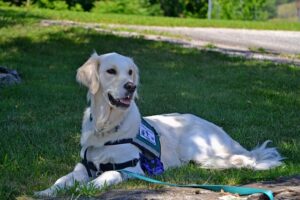What are Service Dogs and How to Get Training?
Service dogs are dogs that are trained to directly assist humans. They have a legal right to accompany their owners in most places. In the United States a service dog is legally protected by federal legislation under the Americans with Disabilities Act of 1990.
Description
Service dogs are used to help people who have disabilities such as a visual or hearing impairment, post traumatic stress disorder, to work with someone in a wheelchair, and perform other tasks for which they are trained.
Regardless of the tasks they will be trained to perform, a potential service dog needs to have certain desirable characteristics that include a good temperament, good health and physical structure, biddability or the willingness to do as he is asked, and trainability. In some cases service dogs are bred specifically for their jobs by service dog organizations. Guide Dogs for the Blind, for instance, has been breeding Golden Retrievers, Labrador Retrievers, and crosses of these two breeds, for decades, specifically for the work they are asked to do because they feel these dogs perform much better than dogs they can obtain from others. The success rate for dogs that are bred and trained by service organizations is about 85 percent. In other cases, dogs are donated to service dog organizations by breeders. Depending on the disability, some shelter dogs can be trained as service dogs.
The terms “service dog” or “assistance dog” or other terms like “helper dog,” “aide dog,” or “support dog” can vary from country to country. In the U.S. there is a difference between a service dog and these other terms. A service dog is protected under the American with Disabilities Act while a therapy dog, for instance, is not.
Benefits
Service dogs provide enormous benefits to their disabled owners. Depending on the type of disability the owner has, the dog can guide the blind, alert the deaf, fetch things for someone in a wheelchair, and so on. The dogs allow their owners to have a great deal more freedom.
Requirements for Certification
Training for service dogs can vary, depending on the kind of disability the dog will be assisting with, but, in general, puppies are placed with a foster family at a young age for socialization. These puppy raisers teach the puppies basic life skills as well as some basic obedience and good manners. After the puppy is evaluated between 12 and 18 months of age, they are usually returned to their training center and their formal training begins. They will learn serious training so they will be well-trained in public They need to learn a working position such as being in the heel position. They must learn to potty only when given the command when they are working. They will be custom-trained for the person they will be assisting, depending on their particular disability. During this time they are working with professional service dog trainers. They must also learn to disregard any distractions. This period of training usually lasts between six months and a year.
Organizations that Offer Service Dog Training
The following organizations provide service dog training for dogs in the United States. Other organizations specialize in specific types of service dog work.
Canine Companions for Independence
Corey Hudson, Clark Pappas
PO Box 446
Santa Rosa, CA 95402-0446
(707) 577-1700
(707) 577-1756 TDD
(707) 577-1711 FAX
email: info@caninecompanions.org
Types of dogs trained: Service, Hearing, Social/Therapy Dogs
Pro-Train
Mark Castillero
1544 Avohill Dr.
Vista, CA 92084
(877) 223-3647
(760) 749-0897
(760) 749-7154 FAX
email: protraindog@gmail.com
Types of dogs trained: Service, Hearing, Guide, Social/Therapy
Paws With a Cause
National Headquarters
4646 South Division
Wayland, Michigan 49348
(616) 877-PAWS TDD/VOICE
(800) 253-PAWS TDD/VOICE
(616) 877-0248 FAX
email: paws@ionline.com
Conclusion
Service dogs greatly improve life for many people with disabilities. It takes a long time to train a service dog but the work they do is invaluable for their owners.

